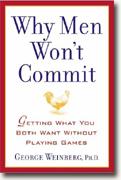George Weinberg
book reviews:
· general fiction
· chick lit/romance
· sci-fi/fantasy
· graphic novels
· nonfiction
· audio books
· author interviews
· children's books @
curledupkids.com
· DVD reviews @
curledupdvd.com
newsletter
win books
buy online
links
home
for authors
& publishers
for reviewers

 |
Why Men Won't Commit: Getting What You Both Want Without Playing Games George Weinberg Atria Books Paperback 224 pages February 2004 |
|
Dr. George Weinberg, author of nine books, clinical psychologist, and practicing therapist for over 25 years, answers the question embedded in Why Men Won't Commit to women -- especially women who want to know how to achieve mutually-loving, balanced, commited, and long-term relationships with men. He bases the book's many suggestions and advice on the premise that men want commitment, love, and permanence in monogamous marriages as much as women do. However, men have been programmed historically to be strong, silent, and "pain resistant" rather than be open to feelings or any signs of self-perceived "weakness" to women. Why? Because of what the author calls "Masculine Pretense." In fact, the book devotes a variety of examples to show how women can become more sensitive to the management of this pretentious threat to their relationships. This male psychological defense, learned in childhood, has been associated with the heroic, stereotypical, "action-oriented" images of man inherent in his self-identity and public persona.
In Chapter Six, "Sex-the Technicolor Experience," Weinberg examines the proposition that one's attitude about sex in a relationship counts more in the long-run than sex acts and perceived short-term satisfactions. He explores the dynamics of when, how, and why a woman may or may not want to have sex with a man in different scenarios. He describes how complicated emotional baggage burdens, stresses, and intensifies the meanings and prospective rewards a man attributes to sex with a spontaneous, loving partner. Consequently, a caring partner who meets these four basic needs and loves more unconditionally will likely meet a healthier man willing to express himself, share love, and meet her needs in the process. The author states, "Showing sexual desire is the ultimate compliment to a man who cares about you." The author cautions us that women's needs count, too, and, of course, women and men share these needs to some degree. However, the focus remains true to the title: it primarily targets men, and what women can do to better understand men in relationships. By learning from case examples, counseling strategies, tips, and avoiding common pitfalls, women can find out if the man they would like to know better can become a trusting, flexible, generous, and loving partner. They want to find a male partner willing to commit to equitable, caring, and intimate relationships. In Why Men Won't Commit, the author also describes unhealthy patterns of women giving up and sacrificing too much of themselves for men. This kind of pattern often leads to lowered self-esteem, chronic anger, and depression. If a woman does not trust her male partner (or herself) to assert what she wants early in the relationship, her share of the relationship can easily become controlled, exploited, or rejected by the man. If she can not accept the consequences of doing something she does not really want to do, then she has to be willing to stop it. If she is too afraid to voice an opinion, disappoint her partner, or experience disapproval, she may become merely a "door mat," so compliant and subdued at the expense of her freedom that she loses the confidence needed to make reasonable choices for herself. Women can abdicate rights and controls to men by default in order to maintain (in their minds) "peaceful" relationships, irrespective of the social-emotional costs involved. The author offers a number of helpful suggestions and specific ways women can assert themselves, make decisions, and argue more effectively to maintain self-esteem and facilitate the development of an intimate relationship. But, they must understand men's basic needs and vulnerable "masculine pretenses" to be successful for life. © 2004 by David L. Johnson, Ph.D. for Curled Up With a Good Book |
|
|
|
 Click here to learn more about this month's sponsor! |
|
| fiction · sf/f · comic books · nonfiction · audio newsletter · free book contest · buy books online review index · links · · authors & publishers reviewers |
|
| site by ELBO Computing Resources, Inc. | |
 The author flatly asserts that ALL men are emotionally weaker than women. Even though psychological needs appear to be surprisingly similar, men tend to hide them behind a rigid, prescribed social role often defended by 'face-saving' denials. These unconscious needs are:
The author flatly asserts that ALL men are emotionally weaker than women. Even though psychological needs appear to be surprisingly similar, men tend to hide them behind a rigid, prescribed social role often defended by 'face-saving' denials. These unconscious needs are: